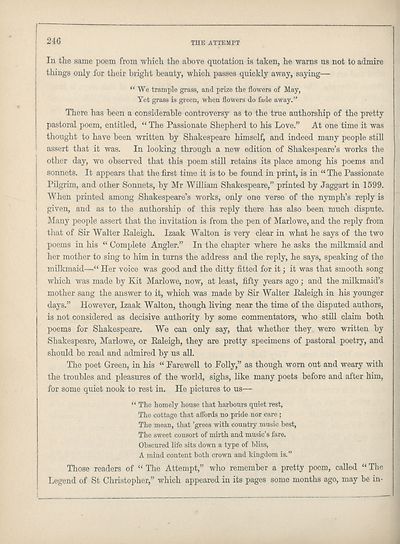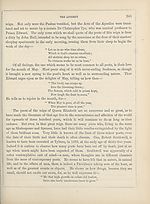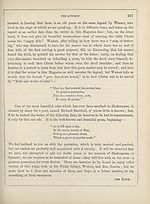Attempt > Volume 1 and Select writings
(258) Page 246
Download files
Complete book:
Individual page:
Thumbnail gallery: Grid view | List view

246
THE ATTEMPT
In the same poem from which the above quotation is taken, he warns us not to admire
things only for their bright beauty, which passes quickly away, saying—
“We trample grass, and prize the flowers of May,
Yet grass is green, when flowers do fade away.”
There has been a considerable controversy as to the true authorship of the pretty
pastoral poem, entitled, “ The Passionate Shepherd to his Love.” At one time it was
thought to have been written by Shakespeare himself, and indeed many people still
assert that it was. In looking through a new edition of Shakespeare’s works the
other day, we observed that this poem still retains its place among his poems and
sonnets. It appears that the first time it is to be found in print, is in “ The Passionate
Pilgrim, and other Sonnets, by Mr William Shakespeare,” printed by Jaggart in 1599.
When printed among Shakespeare’s works, only one verse of the nymph’s reply is
given, and as to the authorship of this reply there has also been much dispute.
Many people assert that the invitation is from the pen of Marlowe, and the reply from
that of Sir Walter Ealeigh. Izaak Walton is very clear in what he says of the two
poems in his “ Complete Angler.” In the chapter where he asks the milkmaid and
her mother to sing to him in turns the address and the reply, he says, speaking of the
milkmaid—“ Her voice was good and the ditty fitted for it; it was that smooth song
which was made by Kit Marlowe, now, at least, fifty years ago ; and the milkmaid’s
mother sang the answer to it, which was made by Sir Walter Ealeigh in his younger
days.” However, Izaak Walton, though living near the time of the disputed authors,
is not considered as decisive authority by some commentators, who still claim both
poems for Shakespeare. We can only say, that whether they were written by
Shakespeare, Marlowe, or Ealeigh, they are pretty specimens of pastoral poetry, and
should bo read and admired by us all.
The poet Green, in his “ Farewell to Folly,” as though worn out and weary with
the troubles and pleasures of the world, sighs, Eke many poets before and after him,
for some quiet nook to rest in. He pictures to us—
“ The homely house that harbours quiet rest,
The cottage that affords no pride nor care ;
The mean, that ’grees with country music best,
The sweet consort of mirth and music’s fare.
Obscured life sits down a type of bliss,
A mind content both crown and kingdom is.”
Those readers of “ The Attempt,” who remember a pretty poem, called “ The
Legend of St Christopher,” which appeared in its pages some months ago, may be in-
THE ATTEMPT
In the same poem from which the above quotation is taken, he warns us not to admire
things only for their bright beauty, which passes quickly away, saying—
“We trample grass, and prize the flowers of May,
Yet grass is green, when flowers do fade away.”
There has been a considerable controversy as to the true authorship of the pretty
pastoral poem, entitled, “ The Passionate Shepherd to his Love.” At one time it was
thought to have been written by Shakespeare himself, and indeed many people still
assert that it was. In looking through a new edition of Shakespeare’s works the
other day, we observed that this poem still retains its place among his poems and
sonnets. It appears that the first time it is to be found in print, is in “ The Passionate
Pilgrim, and other Sonnets, by Mr William Shakespeare,” printed by Jaggart in 1599.
When printed among Shakespeare’s works, only one verse of the nymph’s reply is
given, and as to the authorship of this reply there has also been much dispute.
Many people assert that the invitation is from the pen of Marlowe, and the reply from
that of Sir Walter Ealeigh. Izaak Walton is very clear in what he says of the two
poems in his “ Complete Angler.” In the chapter where he asks the milkmaid and
her mother to sing to him in turns the address and the reply, he says, speaking of the
milkmaid—“ Her voice was good and the ditty fitted for it; it was that smooth song
which was made by Kit Marlowe, now, at least, fifty years ago ; and the milkmaid’s
mother sang the answer to it, which was made by Sir Walter Ealeigh in his younger
days.” However, Izaak Walton, though living near the time of the disputed authors,
is not considered as decisive authority by some commentators, who still claim both
poems for Shakespeare. We can only say, that whether they were written by
Shakespeare, Marlowe, or Ealeigh, they are pretty specimens of pastoral poetry, and
should bo read and admired by us all.
The poet Green, in his “ Farewell to Folly,” as though worn out and weary with
the troubles and pleasures of the world, sighs, Eke many poets before and after him,
for some quiet nook to rest in. He pictures to us—
“ The homely house that harbours quiet rest,
The cottage that affords no pride nor care ;
The mean, that ’grees with country music best,
The sweet consort of mirth and music’s fare.
Obscured life sits down a type of bliss,
A mind content both crown and kingdom is.”
Those readers of “ The Attempt,” who remember a pretty poem, called “ The
Legend of St Christopher,” which appeared in its pages some months ago, may be in-
Set display mode to: Large image | Transcription
Images and transcriptions on this page, including medium image downloads, may be used under the Creative Commons Attribution 4.0 International Licence unless otherwise stated. ![]()
| Ladies' Edinburgh Debating Society publications > Attempt > Volume 1 and Select writings > (258) Page 246 |
|---|
| Permanent URL | https://digital.nls.uk/109868050 |
|---|
| Attribution and copyright: |
|
|---|

